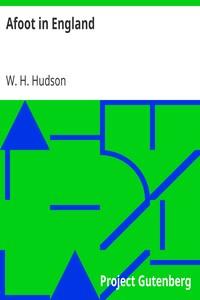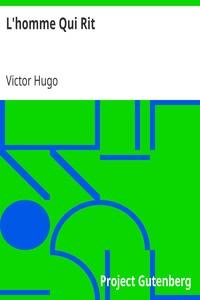|
|
Read this ebook for free! No credit card needed, absolutely nothing to pay.Words: 84543 in 13 pages
This is an ebook sharing website. You can read the uploaded ebooks for free here. No credit cards needed, nothing to pay. If you want to own a digital copy of the ebook, or want to read offline with your favorite ebook-reader, then you can choose to buy and download the ebook.

: Afoot in England by Hudson W H William Henry - England Description and travel United Kingdom@FreeBooksTue 06 Jun, 2023 Guide-books are so many that it seems probable we have more than any other country--possibly more than all the rest of the universe together. Every county has a little library of its own--guides to its towns, churches, abbeys, castles, rivers, mountains; finally, to the county as a whole. They are of all prices and all sizes, from the diminutive paper-covered booklet, worth a penny, to the stout cloth-bound octavo volume which costs eight or ten or twelve shillings, or to the gigantic folio county history, the huge repository from which the guide-book maker gets his materials. For these great works are also guide-books, containing everything we want to learn, only made on so huge a scale as to be suited to the coat pockets of Brobdingnagians rather than of little ordinary men. The wonder of it all comes in when we find that these books, however old and comparatively worthless they may be, are practically never wholly out of date. When a new work is brought out and, say, five thousand copies sold, it does not throw as many, or indeed any, copies of the old book out of circulation: it supersedes nothing. If any man can indulge in the luxury of a new up-to-date guide to any place, and gets rid of his old one , this will be snapped up by poorer men, who will treasure it and hand it down or on to others. Editions of 1860-50-40, and older, are still prized, not merely as keepsakes but for study or reference. Any one can prove this by going the round of a dozen second-hand booksellers in his own district in London. There will be tons of literary rubbish, and good stuff old and new, but few guidebooks--in some cases not one. If you ask your man at a venture for, say, a guide to Hampshire, he will most probably tell you that he has not one in stock; then, in his anxiety to do business, he will, perhaps, fish out a guide to Derbyshire, dated 1854--a shabby old book--and offer it for four or five shillings, the price of a Crabbe in eight volumes, or of Gibbon's Decline and Fall in six volumes, bound in calf. Talk to this man, and to the other eleven, and they will tell you that there is always a sale for guide-books--that the supply does not keep pace with the demand. It may be taken as a fact that most of the books of this kind published during the last half-century--many millions of copies in the aggregate--are still in existence and are valued possessions. There is nothing to quarrel with in all this. As a people we run about a great deal; and having curious minds we naturally wish to know all there is to be known, or all that is interesting to know, about the places we visit. Then, again, our time as a rule being limited, we want the whole matter--history, antiquities, places of interest in the neighbourhood, etc. in a nutshell. The brief book serves its purpose well enough; but it is not thrown away like the newspaper and the magazines; however cheap and badly got up it may be, it is taken home to serve another purpose, to be a help to memory, and nobody can have it until its owner removes himself from this planet; or until the broker seizes his belongings, and guide-books, together with other books, are disposed of in packages by the auctioneer. In all this we see that guide-books are very important to us, and that there is little or no fault to be found with them, since even the worst give some guidance and enable us in after times mentally to revisit distant places. It may then be said that there are really no bad guide-books, and that those that are good in the highest sense are beyond praise. A reverential sentiment, which is almost religious in character, connects itself in our minds with the very name of Murray. It is, however, possible to make an injudicious use of these books, and by so doing to miss the fine point of many a pleasure. The very fact that these books are guides to us and invaluable, and that we readily acquire the habit of taking them about with us and consulting them at frequent intervals, comes between us and that rarest and most exquisite enjoyment to be experienced amidst novel scenes. He that visits a place new to him for some special object rightly informs himself of all that the book can tell him. The knowledge may be useful; pleasure is with him a secondary object. But if pleasure be the main object, it will only be experienced in the highest degree by him who goes without book and discovers what old Fuller called the "observables" for himself. There will be no mental pictures previously formed; consequently what is found will not disappoint. When the mind has been permitted to dwell beforehand on any scene, then, however beautiful or grand it may be, the element of surprise is wanting and admiration is weak. The delight has been discounted. My own plan, which may be recommended only to those who go out for pleasure--who value happiness above useless knowledge, and the pictures that live and glow in memory above albums and collections of photographs--is not to look at a guide-book until the place it treats of has been explored and left behind. The practical person, to whom this may come as a new idea and who wishes not to waste any time in experiments, would doubtless like to hear how the plan works. He will say that he certainly wants all the happiness to be got out of his rambles, but it is clear that without the book in his pocket he would miss many interesting things: Would the greater degree of pleasure experienced in the others be a sufficient compensation? I should say that he would gain more than he would lose; that vivid interest and pleasure in a few things is preferable to that fainter, more diffused feeling experienced in the other case. Again, we have to take into account the value to us of the mental pictures gathered in our wanderings. For we know that only when a scene is viewed emotionally, when it produces in us a shock of pleasure, does it become a permanent possession of the mind; in other words, it registers an image which, when called up before the inner eye, is capable of reproducing a measure of the original delight. In recalling those scenes which have given me the greatest happiness, the images of which are most vivid and lasting, I find that most of them are of scenes or objects which were discovered, as it were, by chance, which I had not heard of, or else had heard of and forgotten, or which I had not expected to see. They came as a surprise, and in the following instance one may see that it makes a vast difference whether we do or do not experience such a sensation. In the course of a ramble on foot in a remote district I came to a small ancient town, set in a cuplike depression amidst high wood-grown hills. The woods were of oak in spring foliage, and against that vivid green I saw the many-gabled tiled roofs and tall chimneys of the old timbered houses, glowing red and warm brown in the brilliant sunshine--a scene of rare beauty, and yet it produced no shock of pleasure; never, in fact, had I looked on a lovely scene for the first time so unemotionally. It seemed to be no new scene, but an old familiar one; and that it had certain degrading associations which took away all delight. The reason of this was that a great railway company had long been "booming" this romantic spot, and large photographs, plain and coloured, of the town and its quaint buildings had for years been staring at me in every station and every railway carriage which I had entered on that line. Photography degrades most things, especially open-air things; and in this case, not only had its poor presentments made the scene too familiar, but something of the degradation in the advertising pictures seemed to attach itself to the very scene. Yet even here, after some pleasureless days spent in vain endeavours to shake off these vulgar associations, I was to experience one of the sweetest surprises and delights of my life. The church of this village-like town is one of its chief attractions; it is a very old and stately building, and its perpendicular tower, nearly a hundred feet high, is one of the noblest in England. It has a magnificent peal of bells, and on a Sunday afternoon they were ringing, filling and flooding that hollow in the hills, seeming to make the houses and trees and the very earth to tremble with the glorious storm of sound. Walking past the church, I followed the streamlet that runs through the town and out by a cleft between the hills to a narrow marshy valley, on the other side of which are precipitous hills, clothed from base to summit in oak woods. As I walked through the cleft the musical roar of the bells followed, and was like a mighty current flowing through and over me; but as I came out the sound from behind ceased suddenly and was now in front, coming back from the hills before me. A sound, but not the same--not a mere echo; and yet an echo it was, the most wonderful I had ever heard. For now that great tempest of musical noise, composed of a multitude of clanging notes with long vibrations, overlapping and mingling and clashing together, seemed at the same time one and many--that tempest from the tower which had mysteriously ceased to be audible came back in strokes or notes distinct and separate and multiplied many times. The sound, the echo, was distributed over the whole face of the steep hill before me, and was changed in character, and it was as if every one of those thousands of oak trees had a peal of bells in it, and that they were raining that far-up bright spiritual tree music down into the valley below. As I stood listening it seemed to me that I had never heard anything so beautiful, nor had any man--not the monk of Eynsham in that vision when he heard the Easter bells on the holy Saturday evening, and described the sound as "a ringing of a marvellous sweetness, as if all the bells in the world, or whatsoever is of sounding, had been rung together at once." Here, then, I had found and had become the possessor of something priceless, since in that moment of surprise and delight the mysterious beautiful sound, with the whole scene, had registered an impression which would outlast all others received at that place, where I had viewed all things with but languid interest. Had it not come as a complete surprise, the emotion experienced and the resultant mental image would not have been so vivid; as it is, I can mentally stand in that valley when I will, seeing that green-wooded hill in front of me and listen to that unearthly music. Naturally, after quitting the spot, I looked at the first opportunity into a guide-book of the district, only to find that it contained not one word about those wonderful illusive sounds! The book-makers had not done their work well, since it is a pleasure after having discovered something delightful for ourselves to know how others have been affected by it and how they describe it. Of many other incidents of the kind I will, in this chapter, relate one more, which has a historical or legendary interest. I was staying with the companion of my walks at a village in Southern England in a district new to us. We arrived on a Saturday, and next morning after breakfast went out for a long walk. Turning into the first path across the fields on leaving the village, we came eventually to an oak wood, which was like an open forest, very wild and solitary. In half an hour's walk among the old oaks and underwood we saw no sign of human occupancy, and heard nothing but the woodland birds. We heard, and then saw, the cuckoo for the first time that season, though it was but April the fourth. But the cuckoo was early that spring and had been heard by some from the middle of March. At length, about half-past ten o'clock, we caught sight of a number of people walking in a kind of straggling procession by a path which crossed ours at right angles, headed by a stout old man in a black smock frock and brown leggings, who carried a big book in one hand. One of the processionists we spoke to told us they came from a hamlet a mile away on the borders of the wood and were on their way to church. We elected to follow them, thinking that the church was at some neighbouring village; to our surprise we found it was in the wood, with no other building in sight--a small ancient-looking church built on a raised mound, surrounded by a wide shallow grass-grown trench, on the border of a marshy stream. The people went in and took their seats, while we remained standing just by the door. Then the priest came from the vestry, and seizing the rope vigorously, pulled at it for five minutes, after which he showed us where to sit and the service began. It was very pleasant there, with the door open to the sunlit forest and the little green churchyard without, with a willow wren, the first I had heard, singing his delicate little strain at intervals. Free books android app tbrJar TBR JAR Read Free books online gutenberg More posts by @FreeBooks
: Grace Harlowe's Overland Riders on the Great American Desert by Chase Josephine - Vacations Juvenile fiction; Adventure and adventurers Juvenile fiction; Deserts Juvenile fiction; Southwest New Juvenile fiction Children's Book Series@FreeBooksTue 06 Jun, 2023

: Short Stories for English Courses by Mikels Rosa Mary Redding Editor - Short stories American@FreeBooksTue 06 Jun, 2023
|
Terms of Use Stock Market News! © gutenberg.org.in2025 All Rights reserved.






